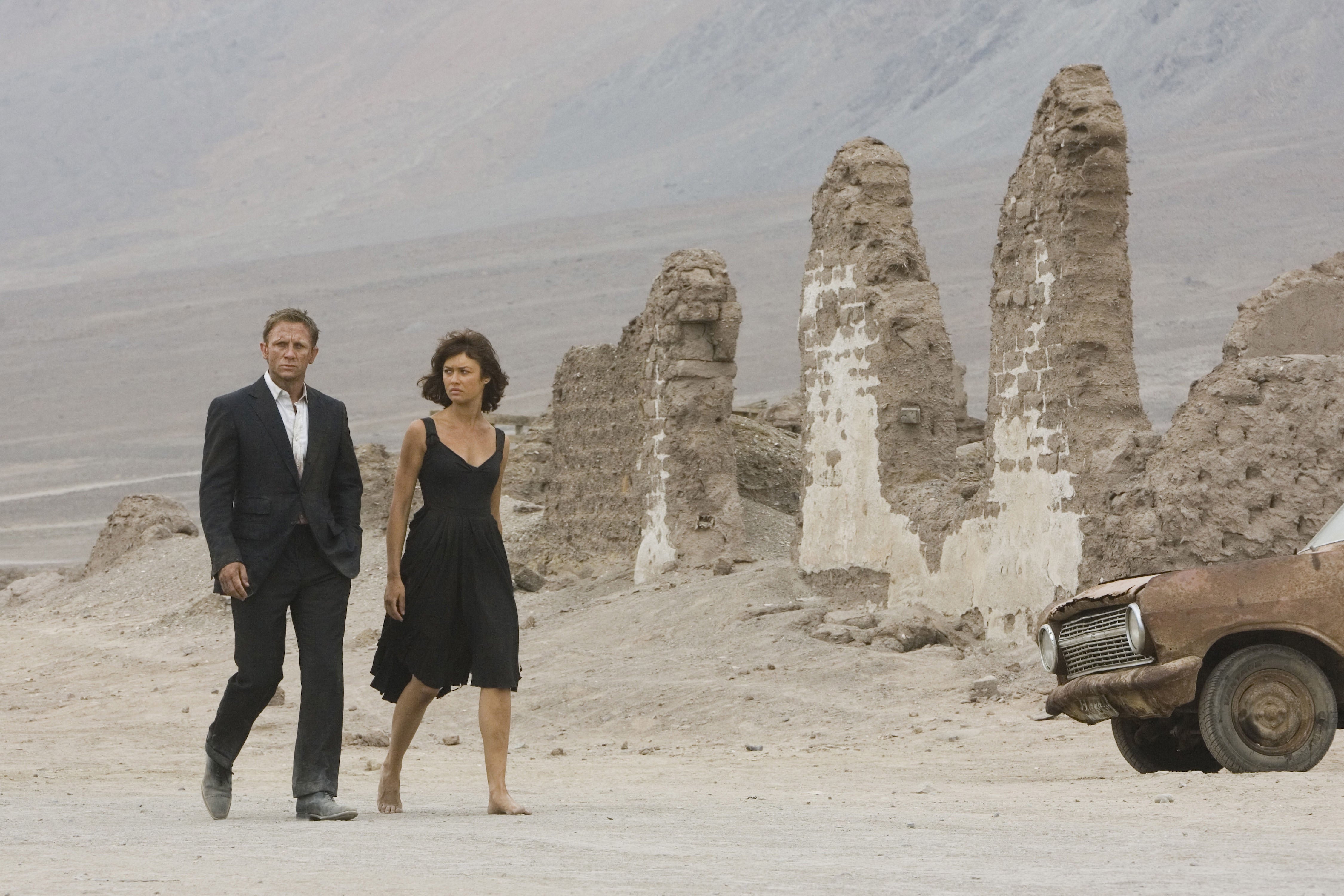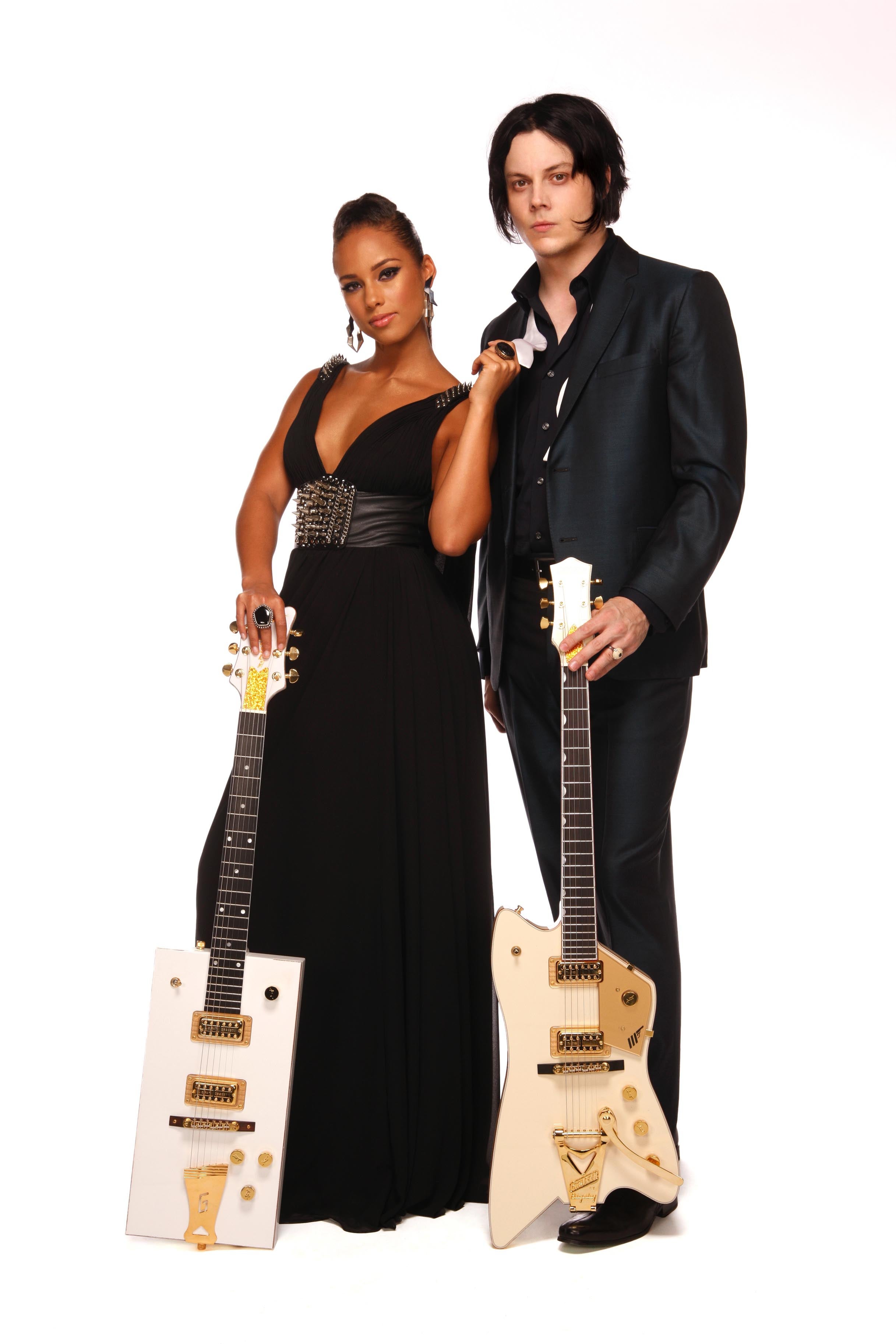Is ‘Another Way to Die’ by Jack White and Alicia Keys the weirdest Bond theme ever?
Ed Power asks if Alicia Keys and Jack White’s bonkers ‘Quantum of Solace’ theme sparked the return of the diva formula

Jack White grew up dreaming of writing a James Bond theme, and in 2002 he did exactly that. “I was a big fan of John Barry, Shirley Bassey,” is how the White Stripes leader would later characterise his love of 007. On another occasion, he expressed the wish to “join the family of Barry, Bassey [and] Connery”.
Unfortunately, the franchise’s custodians at Eon Productions were not at that time in the market for a 007 song by a scruffy bluesman from Detroit. So White tweaked the tune and, as an in-joke, named it after his childhood pronunciation of “Salvation Army”. Released the following year, “Seven Nation Army” turned the White Stripes into international stars and went on to be embraced as a terrace anthem around the world.
Yet for all that success, White never let go of his ambition of inscribing his name into the Bond history books alongside Shirley Bassey, Adele, Duran Duran and others. And then, in 2008, the opportunity to do just that fell into his lap during the chaotic production of Bond 22, Quantum of Solace. That’s how he and R&B superstar Alicia Keys came to collaborate on one of the strangest ever 007 themes: the bonkers and baffling “Another Way to Die” – or, as it really should be called, “Seven Nation Barmy”.
As James Bond prepares to belatedly swoop back into cinemas, with the much-delayed No Time to Die having its premiere on Tuesday, it’s easy to think of 007 as cinema’s ultimate bluechip brand. In fact, James Bond has had his share of embarrassments down the decades, whether that be the invisible car in Pierce Brosnan’s Die Another Day or the invisible charisma of Timothy Dalton in The Living Daylights.
That has been as true of Bond’s theme music as of other aspects of the series. Bond themes have historically fallen into several categories. There are the indisputable classics: Shirley Bassey’s “Goldfinger” and “Diamonds Are Forever”, Wings’s “Live and Let Die”, Carly Simon’s “Nobody Does It Better”. The near misses: the U2-penned, Tina Turner-performed “GoldenEye”, Billie Eilish’s enigmatic “No Time to Die” from the new film.
And there are the “what were they thinking?” ones. This is a surprisingly broad field, including the Bond-goes-grunge Chris Cornell dirge “You Know My Name” (from Casino Royale), Garbage’s clattering “The World Is Not Enough” and “A View to a Kill”, the Duran Duran theme almost as ridiculous as the Roger Moore caper of the same name.
But when it comes to weirdest Bond theme ever, there can be only one. “Another Way to Die” is not, in any conventional sense, a terrible song. It’s too strange for that. Instead, it is the sound of two wildly incompatible artists performing totally different compositions in the same vicinity.
White squawks and does his retro blues thing. Keys plays piano and croons and generally pretends everything is fine (she knows everything is not fine). At no point is there any danger of their two mutually unintelligible styles cohering. The result is a wacky ejector seat of a hodgepodge, taking you places you never wanted, nor were meant, to go.
The sense that things are not quite as they should be extends to the video, in which White, with a white shirt and open tie, dresses like James Bond if James Bond had been mugged on his way home from an all-night vodka binge.
Keys, by contrast, appears not to have received the “pretend you’re in a Bond film” memo and turns up in a nondescript frock. And when she and White howl the chorus – “A door left open/ A woman walking by/ A drop in the water/ A look in your eye” – their lack of chemistry pulsates like a black hole, threatening to vaporise everything around it.
“Another Way to Die” was quickly forgotten by Bond fans. Its obscurity may have something to do with the fact that Quantum of Solace was itself charmless and confusing – easily the worst of the Daniel Craig Bonds. No matter how dazzling the theme song, it would not have rescued Quantum. So in a way it didn’t matter that it was so bizarre.
Or so it will have seemed to the outside world. Within the Bond brain-trust, though, there are reasons to suspect this anomaly prompted a considerable degree of soul-searching. Shaken and stirred by “Another Way to Die”, it is tempting to conclude that Eon swore a blood oath to never again push the Bond theme outside its John Barry/Shirley Bassey safety zone. Ever since Bond songs have stuck to the breathy diva formula, as interpreted by Adele, Sam Smith and now Billie Eilish.
“Jack White and Alicia Keys actually approached Sony about a song, as White was a big Bond fan,” says Jon Burlingame, author of The Music of James Bond, the definitive study of Bond themes. “Certainly the Bond producers were running out of time, as it was already summer and the movie was to be released in October. They all rolled the dice on the White-Keys collaboration.”
“Unfortunately, what they delivered was a disappointment, creatively. The song is not very interesting, either musically or lyrically, with cliches like the rat-a-tat brass and lines like ‘shoot ’em up bang bang’. It had neither the flash or the class that is generally associated with a Bond song. It’s both lame and tedious, and a majority of Bond fans felt this and lashed out against it.”
White and Keys had not initially been on the radar of Quantum of Solace producers Barbara Broccoli and Michael G Wilson. The first choice was Amy Winehouse, working with her regular producer Mark Ronson. However, Winehouse’s dream of taking up her place alongside Shirley Bassey, Carly Simon etc had come unstuck amid her addiction issues and declining health.
“They asked Amy. So hopefully something will come of it,” her long-suffering producer Ronson told BBC Music Week in April 2008. “The demo sounds like a James Bond theme.” But he later admitted the tune would only come about through “some miracle of science”.

“There was no melody or lyric, just a chord pattern and groove that Amy was meant to write alongside,” David Arnold, who composed the score for every Bond from 1997’s Tomorrow Never Dies to Quantum of Solace, subsequently clarified. “None of these were presented to the producers of the movie as there was nothing of substance to play anyone.”
Winehouse later accused Bond’s producers of lacking patience. “I do think they could have waited a bit,” she said to New Magazine. “If they want a worldwide hit I have them all up here in my head. I guess they are going for clean-cut and boring.”
By then it was too late. White and Keys, who had spoken for years about collaborating, had gone to Broccoli and Wilson with their pitch. With the clock ticking, the producers trusted it would be all White on the night.
They may have felt they had little choice. Quantum of Solace was already unravelling thanks to a Hollywood writers’ strike, which meant production had commenced with a half-written script. They sent White and Keys the screenplay (such that it was) and told them to do their best.
In going for a blues-R&B hybrid, White may have felt he and Keys were giving Bond exactly what they wanted. Though recent Bond themes have been lush retro affairs, that wasn’t at all the case as Daniel Craig made his first forays into the franchise.
Garbage and Madonna had already brought their own contemporary spin to 007 during the Brosnan era. The former’s “The World Is Not Enough” from 1999 incorporated trip-hop elements. Madge’s “Die Another Day” (2002) was a full-ahead pop banger.
Craig’s first Bond, Casino Royale, had meanwhile introduced itself via the musky intonations of Soundgarden and Audioslave singer Chris Cornell crooning “You Know Your Name”. These tracks can be seen as representing a calculated break from the past. In the case of the Cornell song, the idea was to distinguish Craig’s sinewy new Bond from his predecessors by utilising a sonic palette markedly different from that of “Golden Era” 007.
“‘Die Another Day’, ‘You Know My Name’ and ‘Another Way to Die’ were meant to update the sound, to find a sonic vocabulary for the supposedly new, post-traumatic Bond,” says Adrian Daub, professor of comparative literature and German studies at Stanford University and co-author of The James Bond Songs: Pop Anthems of Late Capitalism. He’s referring to the seemingly PTSD-affected Bond that Craig has played – where you can see the scars of all his issues down the years.

This approach has changed with the more recent Craig outings, he feels. “From ‘Skyfall’ on, it was a chance for young millennials or Gen Z to cosplay as Shirley Bassey. I think that what accounts for some of the hate the White/Keys effort has received was that it came on the heels of a bunch of songs that seemed keen to be done with the formula. And it turns out fans really clamoured for the formula.”
“The reason why ‘Another Way To Die’ didn’t work as a Bond song was because it was such an odd duet pairing,” adds Sean McCabe of the Time To Bond blog. “It would have been like teaming up Shirley Bassey with Simon Le Bon. I personally don’t hate the song as much as other Bond fans/experts. I have it ranked somewhere in the middle. Ironically, ‘Another Way To Die’ is a better title for the film than “Quantum of Solace”.
Another issue with “Another Way to Die” is that it prioritises White’s musical vision over that of Keys. She has sold considerably more records than the White Stripes man. Yet in both song and video, she takes a backseat as his “genius” is allowed to shine.
“It doesn’t demonstrate the Bond-ballad formula, but what it does demonstrate, alas, is the franchise’s ham-handed ways of interacting with Black women and Black musics,” says Charles Kronengold, assistant professor of musicology at Stanford and co-author, with Adrian Daub, of The James Bond Songs.
“What bothers me about the song is the way its style and sonics kind of assume that White is the auteur – it’s his sound and approach interacting with the Bond-song formula – while Keys is just the hired voice.”
Still, it would be wrong to be too harsh on White and Keys. They tried something different and gave 007 its first (and presumably only) lo-fi gutbucket blues duet. Where, moreover, would be Bond be without its glorious failures?
One of the reasons the franchise is so beloved, it can be argued, is that it gives itself permission to lose the plot every now and then. How dull Bond would be if every 007 excursion was a Goldfinger or Skyfall. Bond needs its Moonraker (Bond in Space) and its A View to a Kill (Bond halfway up the Golden Gate Bridge).
“Another Way To Die” is part of that rich, outlandish tapestry. Most Bond fans could easily go through the rest of their lives without ever hearing it again. And yet a little part of them must be pleased it exists – if only because it allows us to appreciate truly great Bond themes such as Adele’s “Skyfall” all the more.
No Time to Die is released on 8 October
Join our commenting forum
Join thought-provoking conversations, follow other Independent readers and see their replies
Comments


Bookmark popover
Removed from bookmarks